September 2023
Participation ICCS 2023
15/09/23/09:59 Filed in: Conference participation | Chairing
28th Int Conf on Conceptual Structures, ICCS, Berlin, Germany, Sep 11-13, 2023
This edition has been organised by Manuel Ojeda-Aciego as Program co-chair (in the picture with Inma P. Cabrera and Pablo Cordero)
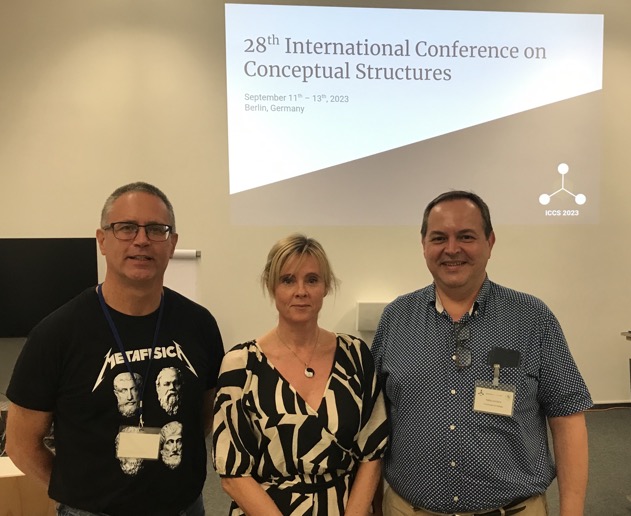
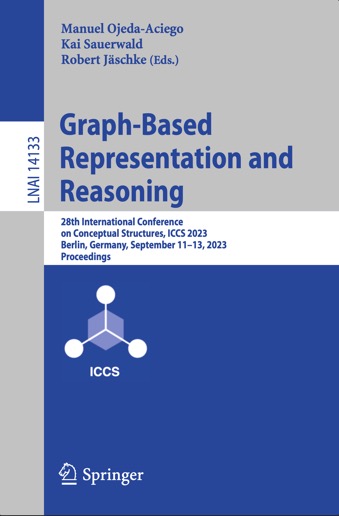
Domingo López-Rodríguez participated with an invited tutorial on the R package fcaR.
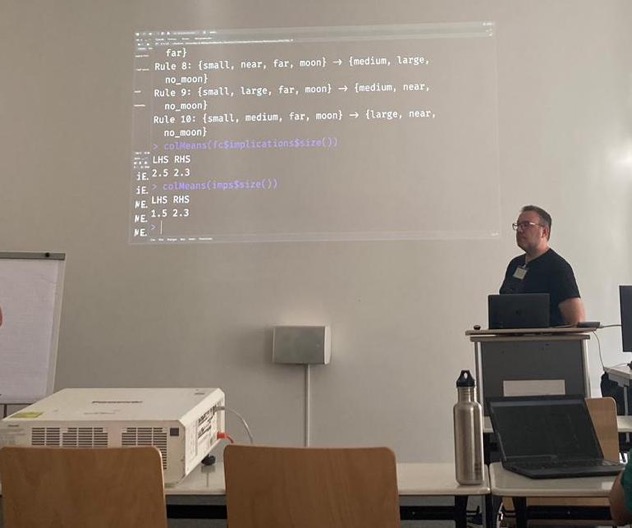
The two accepted papers were presented by Manuel Ojeda Hernández:
- Aggregation Functions and Extent Structure Preservation in Formal Concept Analysis
- On Pseudointents in Fuzzy Formal Concept Analysis
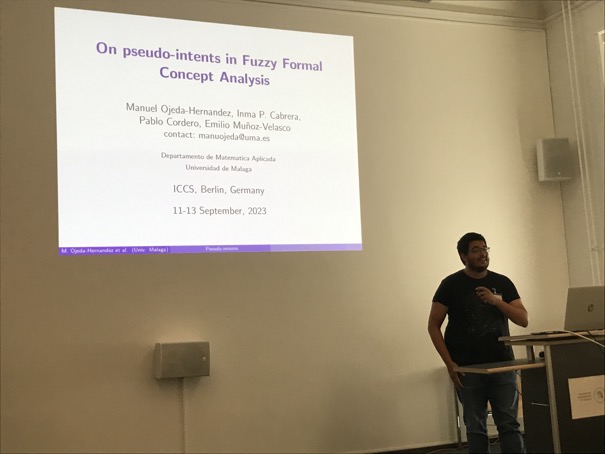
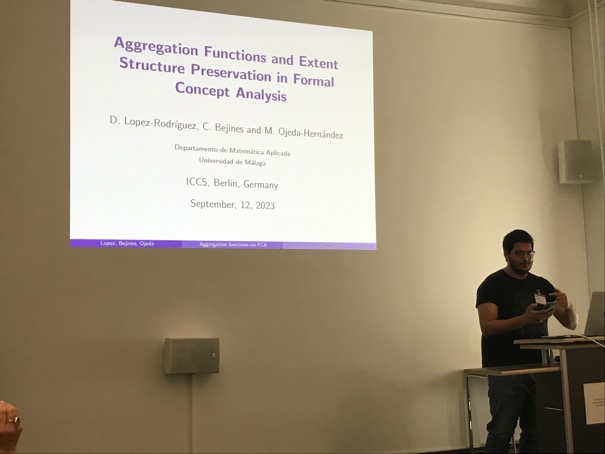
Participation EUSFLAT 2023
10/09/23/09:59 Filed in: Conference participation
13th Conf of the European Association for Fuzzy Logic and Technology, EUSFLAT, Palma, Spain, September 5-9, 2023
After the previous hybrid edition, EUSFLAT is again a face-to-face meeting, where we could meet again a number of friends, and attended some very interesting talks. In the picture: Emilio Muñoz-Velasco, Manuel Ojeda-Hernández and Manuel Ojeda-Aciego.
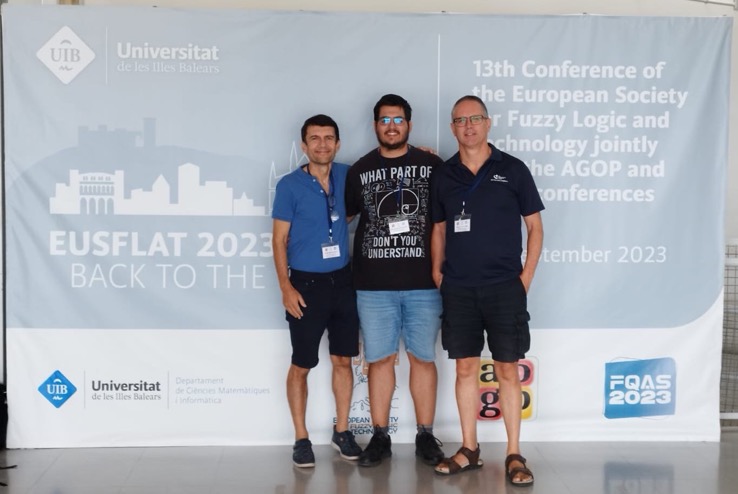
In this edition, we presented two works
- Closure structures as fixed points of some Galois connections (presented by Manuel Ojeda-Hernández)
- A Logic to Reason About f-Indices of Inclusion over Ł𝑛 (presented by Lluís Godo, co-author)
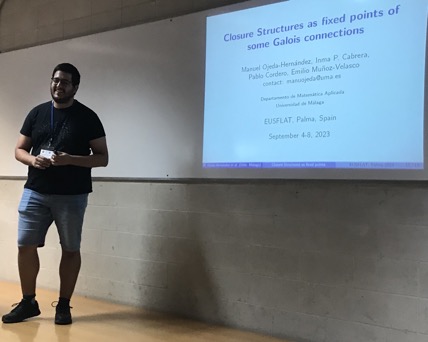
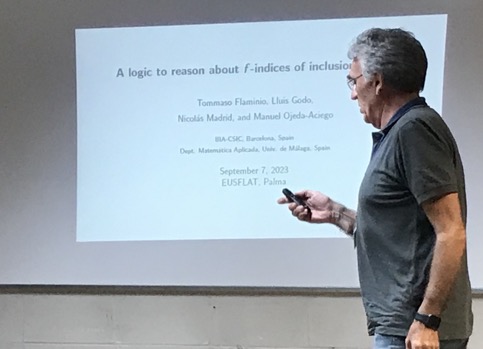
Journal paper accepted: INS, KYB
01/09/23/12:17 Filed in: Journal papers
O. Krídlo, D. López-Rodríguez, L. Antoni, P. Eliaš, S. Krajči, and M. Ojeda-Aciego. Connecting concept lattices with bonds induced by external information. Information Sciences, 648:Article 119498, 2023.
ABSTRACT In Formal Concept Analysis (FCA), L-bonds represent relationships between L-formal contexts. Choosing the appropriate bond between L-fuzzy formal contexts is an important challenge for its application in recommendation tasks. Recent work introduced two constructions of bonds, given by direct products of two L-fuzzy formal contexts, and showed their usefulness in a particular application. In this paper, we present further theoretical and experimental results on these constructions; in particular, we provide extended interpretations of both rigorous and benevolent concept-forming operators, introduce new theoretical properties of the proposed bonds to connect two concept lattices given external information, and finally present the experimental study of the upper bounds.
C. Bejines. Aggregation of fuzzy vector spaces. Kybernetika 59(5):752-767, 2023.
ABSTRACT This paper contributes to the ongoing investigation of aggregating algebraic structures, with a particular focus on the aggregation of fuzzy vector spaces. The article is structured into three distinct parts, each addressing a specific aspect of the aggregation process. The first part of the paper explores the self-aggregation of fuzzy vector subspaces. It delves into the intricacies of combining and consolidating fuzzy vector subspaces to obtain a coherent and comprehensive outcome. The second part of the paper centers around the aggregation of similar fuzzy vector subspaces, specifically those belonging to the same equivalence class. This section scrutinizes the challenges and considerations involved in aggregating fuzzy vector subspaces with shared characteristics. The third part of the paper takes a broad perspective, providing an analysis of the aggregation problem of fuzzy vector subspaces from a general standpoint. It examines the fundamental issues, principles, and implications associated with aggregating fuzzy vector subspaces in a comprehensive manner. By elucidating these three key aspects, this paper contributes to the advancement of knowledge in the field of aggregation of algebraic structures, shedding light on the specific domain of fuzzy vector spaces.
Conference papers accepted: EUSFLAT
01/09/23/12:17 Filed in: Conference papers
T. Flaminio, Ll. Godo, N. Madrid, M. Ojeda-Aciego. A Logic to Reason About f-Indices of Inclusion over Ł𝑛. Proc. of EUSFLAT 2023.
ABSTRACT In this paper we provide a sound and complete logic to formalise and reason about f-indices of inclusion. The logic is based on finite-valued Lukasiewicz logic and its S5-like modal extension S5(L) with additional unary operators.
Published in Lecture Notes in Computer Science, vol 14069: 530-539, 2023.
M. Ojeda-Hernández, P. Cordero, I.P. Cabrera, E. Muñoz-Velasco. Closure structures as fixed points of some Galois connections. Proc. of EUSFLAT 2023.
Extended abstract published in Book of Abstracts EUSFLAT 2023.
Conference papers accepted: ICCS
01/09/23/12:17 Filed in: Conference papers
C. Bejines, D. López-Rodríguez, M. Ojeda-Hernández. Aggregation Functions and Extent Structure Preservation in Formal Concept Analysis. Proc. of Int. Conf. on Conceptual Structures.
ABSTRACT Formal Concept Analysis (FCA) is a mathematical framework for analysing data tables that capture the relationship between objects and attributes. The concept lattice derived from such a table is a representation of the implicit knowledge about this relationship, where each concept corresponds to a bicluster of objects and attributes. FCA has been widely used for knowledge acquisition and representation, conceptual data analysis, information retrieval and other applications. In this paper, we use an extension of the classical FCA to deal with fuzzy formal contexts, where the relationship between objects and attributes is modelled by truth values indicating the degree to which an object possesses a property or attribute. Fuzzy Formal Concept Analysis (FFCA) allows us to capture vague or imprecise information and handle uncertainty or ambiguity in data analysis. Our purpose is to use aggregation functions in order to manipulate and explore fuzzy formal concepts in different ways depending on the desired properties or criteria. In this work, we will focus on the structure of the extents of the concept lattice. We define the aggregation of fuzzy extents point-wise and study how it affects its structure. We characterise the aggregation functions that preserve the fuzzy extent structure and show that they depend on the number of objects in the context. Our results contribute to a better understanding of how aggregation functions can be used to manipulate and explore fuzzy formal concepts..
Published as Lecture Notes in Computer Science, vol 14133: 28-35, 2023
M. Ojeda-Hernández, I. P. Cabrera, P. Cordero, E. Muñoz-Velasco. On Pseudointents in Fuzzy Formal Concept Analysis. Proc. of Int. Conf. on Conceptual Structures.
ABSTRACT Formal Concept Analysis (FCA) is a mathematical framework for analysing data tables that capture the relationship between objects and attributes. FCA deals with two main structures of knowledge, namely the concept lattice and the basis of attribute implications. There are several sets of implications in the literature, for instance minimal bases, direct bases or direct minimal bases. In this work we are interested in the concept of pseudointent in the fuzzy framework in order to define the Duquenne-Guigues basis in the fuzzy setting.
Published as Lecture Notes in Computer Science, vol 14133: 36-40, 2023
